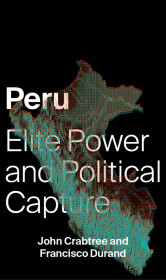 Neuerscheinungen 2017Stand: 2020-02-01 |
Schnellsuche
ISBN/Stichwort/Autor
|
Herderstra▀e 10
10625 Berlin
Tel.: 030 315 714 16
Fax 030 315 714 14
info@buchspektrum.de |

John Crabtree, Francisco Durand
(Beteiligte)
Peru
Elite Power and Political Capture
2017. 256 S. 222 mm
Verlag/Jahr: ZED BOOKS 2017
ISBN: 1-78360-904-4 (1783609044)
Neue ISBN: 978-1-78360-904-8 (9781783609048)
Preis und Lieferzeit: Bitte klicken
Crabtree and Durand explore how the Peruvian elite and foreign mining interests have been able to entrench their position and marginalise the left, even as leftist governments have risen to power elsewhere on the continent.
While leftist governments have been elected across Latin America, this ┤Pink Tide┤ has so far failed to reach Peru. Instead, the corporate elite remains firmly entrenched, and the left continues to be marginalised. Peru therefore represents a particularly stark example of ┤state capture┤, in which an extreme concentration of wealth in the hands of a few corporations and pro-market technocrats has resulted in a monopoly on political power.
Post the 2016 elections, John Crabtree and Francisco Durand look at the ways in which these elites have been able to consolidate their position at the expense of genuine democracy, with a particular focus on the role of mining and other extractive industries, where extensive privatization and deregulation has contributed to extreme disparities in wealth and power.
In the process, Crabtree and Durand provide a unique case study of state development, by revealing the mechanisms used by elites to dominate political discussion and marginalize their opponents, as well as the role played by external actors such as international financial institutions and foreign investors. The significance of Crabtree┤s findings therefore extends far beyond Peru, and illuminates the wider issue of why mineral-rich countries so often struggle to attain meaningful democracy.
Introduction
1. A Conceptual and Historical Introduction to Political Capture
2. Development of the Peruvian State since Independence
3. State Autonomy and Peruvian Elites
4. The Birth of the Neoliberal State
5. The Power of the New Elites
6. Problems of Distribution, Poverty and Decentralisation
7. The Deficiencies of a Disconnected State
8. Conclusions
Bibliography
Index
John Crabtree is a Research Associate at the Latin American Studies Centre, University of Oxford, a Senior Member of Saint Antony┤s College, Oxford, and (currently) a Visiting Researcher at Oxford Brookes University, Oxford. His most recent published books are Bolivia: Processes of Change co-authored with Ann Chaplin (Zed 2013), and Fractured Politics: Peruvian Democracy Past and Present (2011).
Francisco Durand is a Research Associate at DESCO-Centro de Estudios de Promociˇn del Desarrollo and Professor of Politics at the Catholic University of Peru (PUCP). His books in English include Business and Politics in Peru (1993), and Organized Business, Democracy and Economic Change (1996).


